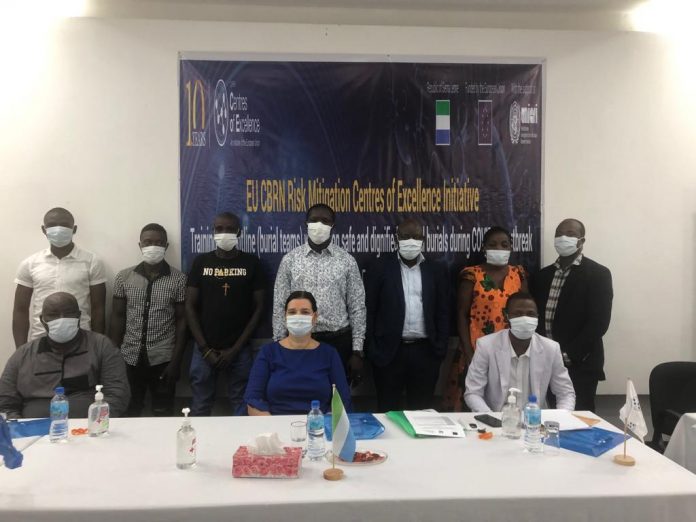By Amin Kef Sesay
With supports from the European Union (EU), the CBRN National Focal Point of Sierra Leone and the Ministry of Health and Sanitation, in collaboration with the National COVID-19 Emergency Response Centre (NACOVERC) has organized two trainings for frontline workers (burial teams) on safe and dignified medical burials.
It was stated in an European Union Press Release that the EU CBRN Centres of Excellence (EU CBRN CoE) Risk Mitigation Initiative had already supported Sierra Leone on the post-Ebola era with a three-year project (2016-2018) on the management of epidemics, with a specific module on burial management.
In addition, it was further highlighted how the EU CBRN CoE is continuing its support by promoting these two new trainings that commenced in Freetown for the Western Urban District on the 22nd June 2020 and will end on the 24th June 2020 and in Waterloo for the Western Rural District to commence on the 25th June to end on the 27th June 2020 epicentres of the Covid-19 outbreak.
The release maintained that cross contamination or nosocomial infection from managing dead bodies is a potential risk to public health also stating that the enhancement of capacities of burial teams handling COVID-19 and non COVID-19 burials is therefore of high importance.
The trainings, which are being delivered by experts of the Ministry of Health and Sanitation who are active members of the CBRN National Team of Sierra Leone, are focusing on the enhancement of burial teams’ capacities in terms of rapid detection, investigation and notification of COVID-19 cases, safe and dignified medical burials, effective and efficient surveillance and contact tracing of COVID-19 cases. 50 beneficiaries are targeted for the trainings during the two events of three-day each.
These two training activities are part of the European Union support to the COVID-19 crisis, and in particular of its EU CBRN Centres of Excellence (EU CBRN CoE) Risk Mitigation Initiative. The Republic of Sierra Leone joined the Initiative in 2016 and is member of the African Atlantic Façade Regional Secretariat based in Rabat, Morocco.
Incidents involving CBRN materials and agents have dramatic human, social and economic consequences. In some cases, their consequences may reach a point where they actually threaten to jeopardize development achievements. However, to an extent, these incidents can be prevented, and their consequences mitigated through preparedness and coordination.
It is with this objective – to strengthen CBRN governance worldwide – that the EU established the CoE Initiative. Launched in 2010, it aims to support countries in their efforts to prevent, prepare for and respond to CBRN-related incidents which can be of a criminal, accidental or natural origin. It does so by promoting and supporting political and operational cooperation at national, regional and international levels. As CBRN threats are often transnational nature, requiring a high-level of expertise, sharing best practices and pooling resources, the EU CBRN CoE takes a regional approach.
There are three levels of assistance to participating countries. At the institutional level, the Initiative supports the work of a CBRN National Team comprised of all relevant stakeholders and coordinated by a CBRN National Focal Point. At the strategic level, it assists countries in the identification of risks and needs through the development of a CBRN National Action Plan that is prepared over a series of workshops using a specifically developed methodology.
At the operational level, partner countries benefit from a range of regional capacity-building projects developed to address identified risks and needs in coordination with local experts. These projects cover a wide variety of fields including, for example, safety and security, emergency planning, crisis response, export control, illicit trafficking, storage and disposal, and redeployment of scientists.
To date, there are 61 partner countries gathered in 8 Centres of Excellences, including South East and Eastern Europe; African Atlantic Façade; North Africa and Sahel; Eastern and Central Africa; Middle East; Gulf Cooperation Council Countries; Central Asia; and South-East Asia. These centres are administered by a Regional Secretariat located in one partner country in each region. These secretariats benefit from administrative, logistical as well as technical assistance. Sierra Leone is part of the Centre of Excellence for the countries of the African Atlantic Façade since May 2016 together with Morocco (where the Regional Secretariat is based), Mauritania, Senegal, Liberia, Ivory Coast, Togo, Benin, Cameroon and Gabon.
Compared to other endeavours, the specific added value of this EU Initiative, financed with a budget of EUR 250 M for the period 2010-2020, is to promote a holistic approach to managing CBRN risks and threats which are all too often tackled separately despite sharing many common characteristics and to create a sustainable network of international experts and authorities at the disposal of participating countries.






